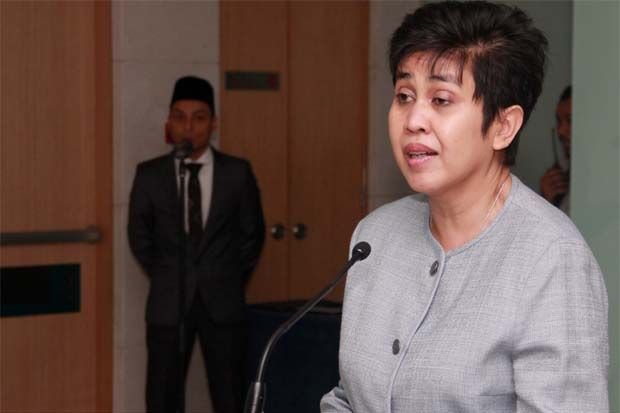The Interpretation of a Female Person the lead a Muslim Country
Interpretation of the Ancient Texts like the Koran or the Bible can be subjective.
Many western countries are led by female President or Prime Minister, and there is no problem. The best leader should be allowed to lead a country whether male or female. History shows clearly that there are female leaders capable to lead a country.

Margaret Thatcher was PM of England and she served as Prime Minister of the United Kingdom from 1979 to 1990 and Leader of the Conservative Party from 1975 to 1990.
Now Theresa May is new leader. Who is she? Theresa Mary May is a British politician serving as Prime Minister of the United Kingdom and Leader of the Conservative Party since 2016. She served as Home Secretary from 2010 to 2016.
Other female leader like Golda Meir who was an Israeli teacher, kibbutznik, stateswoman, politician and the fourth Prime Minister of Israel. Meir was elected Prime Minister of Israel on March 17, 1969, after serving as Minister of Labour and Foreign Minister.
In Malaysia, the new governor of Bank Negara is a Muslim woman Nor Shamsiah and before her there was another Muslim lady Dr Zeti Akhtar Ungku Aziz. She was the 7th Governor of Bank Negara Malaysia, Malaysia's central bank. She was governor from 2000 to 2016, and was the first woman in the position.
Even in a Muslim country like Pakistan, we had a female prime minister. Who is she?
Benazir Bhutto was a Pakistani politician who served as Prime Minister of Pakistan from 1988 to 1990 and again from 1993 to 1996. She was the first woman to head a democratic government in a Muslim majority nation.
In Malaysia, interpretation of the ancient text like the Koran gives plenty of room for debates and personal interpretations. One of the important and crucial issues that is hotly debated among some Muslim scholars is connected with the position of Islam on the female headship of the state.
Ironically when the new Coalition of Hope won the General Election in Malaysia on 9th of May 2018, the King requested the leader of the Justice Party Dr Wan Azizah to be the PM. She did not accept because the coalition of Hope which is made up of 4 parties: Justice party(PKR) Democratic Action party (DAP), Integrity party (AMANAH) and Pribumi party (BERSATU) had agreed to the nomination of Tun Dr Mahathir as the Prime Minister. After five times of persuasion, she still refused but agreed to be the deputy PM, the king had no choice by to instal Tun Dr Mahathir as the PM. The reason for not wanting Mahathir as the PM may be due to his age at 93 years old and his former policies against the monarch and states' sultans.
But Dr Wan Azizah is a lady of principle and she could not go against what had been agreed upon.
The King action sheds some light on of the important and crucial issues that is hotly debated among some Muslim scholars. What is the issue? It is connected with the position of Islam on the female headship of the state.
Some Muslim scholars based on their own interpretations of some Islamic texts, (a few verses of the Quran and a few prophetic traditions, the hadith), conclude that Islam does not allow the headship of state to a woman. The Quranic verse generally quoted in this connection is the following:
"Men are in charge of women, because what Allah has given one over the other and what they spend (for maintenance) from their wealth. (4:34)"
Such interpretations are outdated and incorrect. Generally, scholars who disagree with the headship of woman interpret the term "qawwam", as occurred in the above verse, in terms of the superiority of men over women in all social institutions and assert that men alone are eligible to be the heads of families and states, not women.
If modern society is to follow this outdated interpretation of some of these Muslim scholars, society would have lost half of its talents. However, some other scholars assert that the above verse stands in context for the family; not the society and state. They contend that the above verse does not speak about the superiority of men over women but only talks about the financial responsibility of men for financial maintenance and protection of women because they are generally physically stronger than women. This verse was coined to send the message on the complementing functions of men and women, based on some gender differences between them.
Men are exempted from child-bearing and childbirth because they are physically different from women. In the same way, women are exempted from taking financial responsibility as obligatory because they are physically constituted differently from men. However, it does not mean that women are forbidden from sharing financial responsibility with men because there is a difference between ‘obligation’ and ‘option’. Interpretation of the old text should be ponder carefully for society to progress not regress and go backward. Many women are more capable than many men and we have to accept the fact that men and women are equal.
